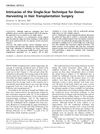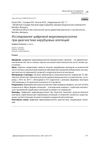 September 2023 in “International journal of biomedicine”
September 2023 in “International journal of biomedicine” Minoxidil might help treat acne scars by reducing collagen buildup.
 April 2023 in “Research Square (Research Square)”
April 2023 in “Research Square (Research Square)” Combining stromal vascular fraction (SVF) injections with fractional CO2 laser treatment is more effective for treating burn scars than using the laser alone.
 April 2023 in “Journal of Investigative Dermatology”
April 2023 in “Journal of Investigative Dermatology” Both laser treatments improved acne scars similarly, but the Nd:YAG laser was safer and less painful, while the Er:YAG laser left patients slightly more satisfied.
 July 2022 in “The Egyptian Journal of Plastic and Reconstructive Surgery”
July 2022 in “The Egyptian Journal of Plastic and Reconstructive Surgery” Using Platelet Rich Plasma with hair transplants is effective for treating hair loss due to burns.
 April 2022 in “The Egyptian Journal of Hospital Medicine”
April 2022 in “The Egyptian Journal of Hospital Medicine” Platelet Rich Fibrin improves healing and reduces acne scars by slowly releasing growth factors.
 October 2021 in “The Egyptian Journal of Hospital Medicine ”
October 2021 in “The Egyptian Journal of Hospital Medicine ” Combination therapies work better than single treatments for atrophic acne scars.
 June 2021 in “Dermatologic surgery”
June 2021 in “Dermatologic surgery” Researchers suggest using a standard question and 5-point scale to measure patient satisfaction with acne scar treatments.
February 2020 in “International Journal of Contemporary Medicine” Microneedling combined with platelet-rich plasma therapy effectively improves acne scars in most cases without serious complications.
 January 2019 in “Paëmi Sino”
January 2019 in “Paëmi Sino” Women with keloid scars often have acne and hair loss, especially those with "true" keloids, indicating a possible hormonal imbalance.

Pig tissue can be used to prevent hair loss, aid in hair restoration surgery, and improve healing of donor scars.
 June 2004 in “Dermatologic Surgery”
June 2004 in “Dermatologic Surgery” The single-scar technique in hair transplantation minimizes scarring and preserves hairs for future use, with proper training overcoming its perceived drawbacks.
 October 2024 in “Frontiers in Nutrition”
October 2024 in “Frontiers in Nutrition” Vitamin D deficiency is common in people with certain types of hair loss, like alopecia areata and female pattern hair loss.
 September 2024 in “Archiv Euromedica”
September 2024 in “Archiv Euromedica” Trichoscopy is a quick, accurate, and non-invasive method to diagnose and treat non-scarring hair loss.
 September 2024 in “Journal of the American Academy of Dermatology”
September 2024 in “Journal of the American Academy of Dermatology” Iron infusions can help improve hair loss in patients who can't take oral iron supplements.
 August 2024 in “EMJ Dermatology”
August 2024 in “EMJ Dermatology” Non-scarring alopecia in females affects emotional well-being and requires accurate diagnosis and personalized treatment.
 July 2024 in “Clinical Cosmetic and Investigational Dermatology”
July 2024 in “Clinical Cosmetic and Investigational Dermatology” Certain immune cells are linked to non-scarring hair loss, suggesting potential for immune-targeted treatments.
 June 2024 in “Дерматовенерология Косметология”
June 2024 in “Дерматовенерология Косметология” Autologous follicular stem cells improved hair loss in 57% of patients.

Higher levels of β-carotene and vitamin E may help prevent certain types of hair loss.
 April 2024 in “African Journal of Biological Sciences”
April 2024 in “African Journal of Biological Sciences” The patient with lupus and Degos' disease showed significant improvement with treatment.
 March 2024 in “Frontiers in Endocrinology”
March 2024 in “Frontiers in Endocrinology” The study found that alopecia areata and hypothyroidism increase the risk of each other, but androgenetic alopecia and hypothyroidism do not.
 January 2024 in “Pan African Medical Journal”
January 2024 in “Pan African Medical Journal” Non-scarring hair loss is common in lupus patients and can be diagnosed with specific hair and tissue tests.
 November 2023 in “Journal of Cosmetic Dermatology”
November 2023 in “Journal of Cosmetic Dermatology” People with non-scarring hair loss often have lower vitamin D levels than those without hair loss.
 September 2023 in “Дерматовенерология, косметология”
September 2023 in “Дерматовенерология, косметология” Digital video microscopy is a useful non-invasive tool for diagnosing non-scarring alopecia.
 September 2023 in “Medical lasers”
September 2023 in “Medical lasers” The botanical shampoo with Morus alba root extract is safe and effective for treating hair loss.
August 2023 in “Annales de Dermatologie et de Vénéréologie” Non-scarring hair loss in lupus patients often responds well to treatment and doesn't lead to scarring.
 June 2023 in “International journal of pharmaceutical quality assurance”
June 2023 in “International journal of pharmaceutical quality assurance” Videodermoscopy is effective for diagnosing different types of non-scarring hair loss.
 May 2023 in “Research Square (Research Square)”
May 2023 in “Research Square (Research Square)” Wearing a hijab may lead to earlier hair loss due to vitamin D deficiency and scalp conditions.
 April 2023 in “The Egyptian Journal of Hospital Medicine”
April 2023 in “The Egyptian Journal of Hospital Medicine” Injecting platelet-rich plasma is a safe and effective way to improve different types of post-burn scars.
March 2023 in “Nigerian Journal of Clinical Practice” The main difference in hair loss for lupus patients is smaller and fewer sebaceous glands.
 December 2022 in “Cureus”
December 2022 in “Cureus” Low iron levels are linked to hair loss in women.



























